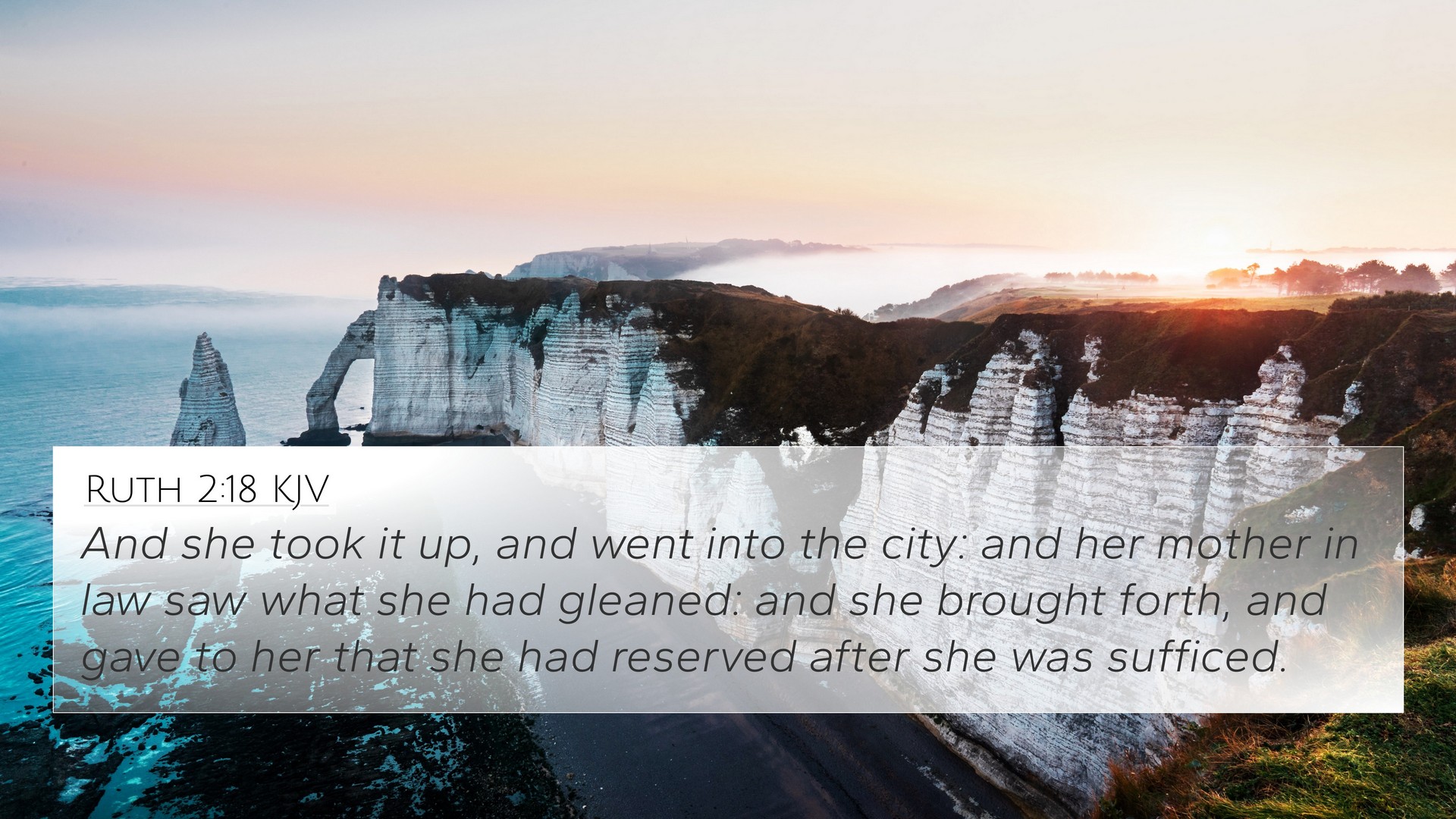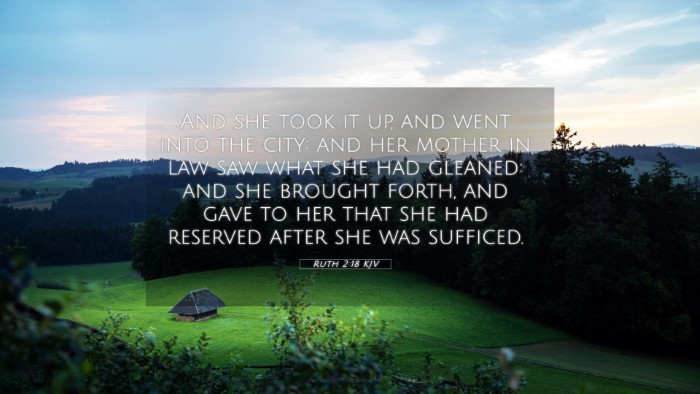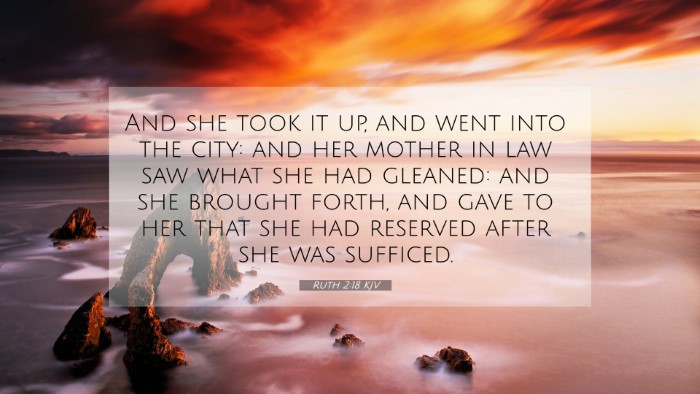Old Testament
Genesis Exodus Leviticus Numbers Deuteronomy Joshua Judges Ruth 1 Samuel 2 Samuel 1 Kings 2 Kings 1 Chronicles 2 Chronicles Ezra Nehemiah Esther Job Psalms Proverbs Ecclesiastes Song of Solomon Isaiah Jeremiah Lamentations Ezekiel Daniel Hosea Joel Amos Obadiah Jonah Micah Nahum Habakkuk Zephaniah Haggai Zechariah MalachiRuth 2:18 Similar Verses
Ruth 2:18 Cross References
And she took it up, and went into the city: and her mother in law saw what she had gleaned: and she brought forth, and gave to her that she had reserved after she was sufficed.
Uncover the Rich Themes and Topics of This Bible Verse
Listed below are the Bible themes associated with Ruth 2:18. We invite you to explore each theme to gain deeper insights into the Scriptures.
Ruth 2:18 Cross Reference Verses
This section features a detailed cross-reference designed to enrich your understanding of the Scriptures. Below, you will find carefully selected verses that echo the themes and teachings related to Ruth 2:18 KJV. Click on any image to explore detailed analyses of related Bible verses and uncover deeper theological insights.
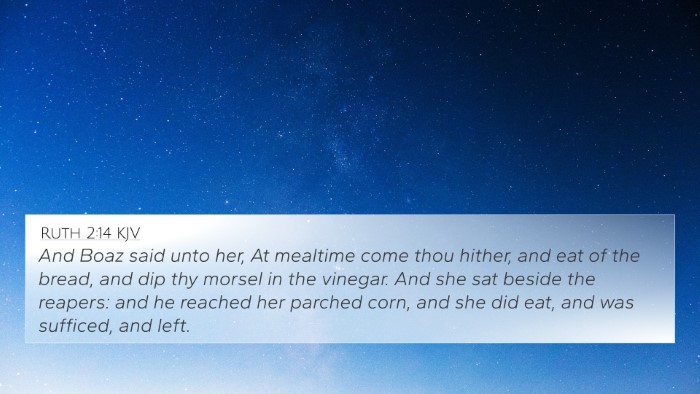
Ruth 2:14 (KJV) »
And Boaz said unto her, At mealtime come thou hither, and eat of the bread, and dip thy morsel in the vinegar. And she sat beside the reapers: and he reached her parched corn, and she did eat, and was sufficed, and left.
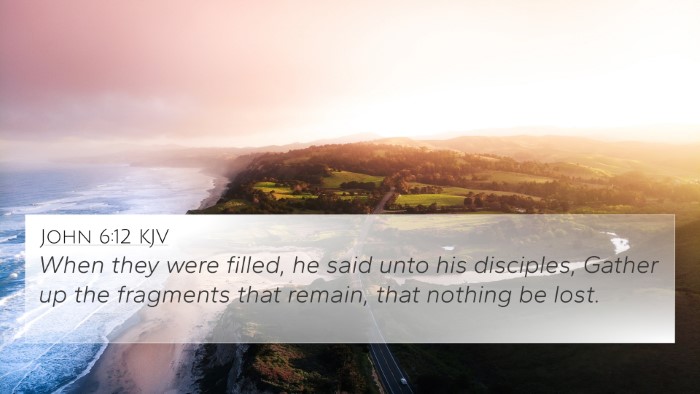
John 6:12 (KJV) »
When they were filled, he said unto his disciples, Gather up the fragments that remain, that nothing be lost.
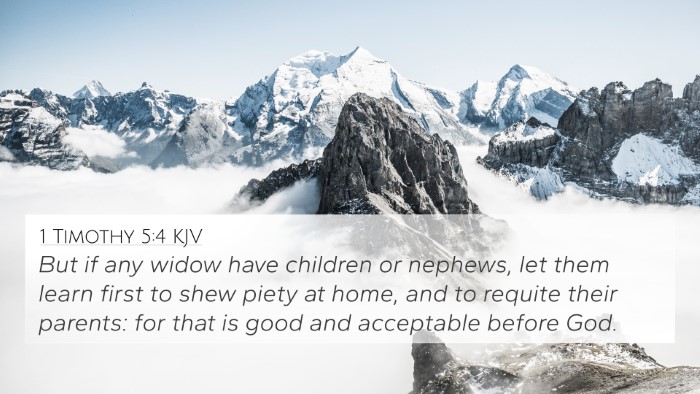
1 Timothy 5:4 (KJV) »
But if any widow have children or nephews, let them learn first to shew piety at home, and to requite their parents: for that is good and acceptable before God.
Ruth 2:18 Verse Analysis and Similar Verses
Understanding Ruth 2:18
Ruth 2:18: "And she took it up, and went into the city: and her mother in law saw what she had gleaned: and she brought forth, and gave to her that which her had reserved after she was sufficed."
This verse from the book of Ruth encapsulates not only the providential care of God but also the themes of provision, community, and loyalty woven throughout the narrative. Below is a comprehensive analysis combining insights from public domain commentaries by Matthew Henry, Albert Barnes, and Adam Clarke.
Verse Meaning and Interpretation
The verse signifies Ruth's return home after gleaning in the fields of Boaz, showcasing several key themes:
- God's Provision: Just as Ruth finds a bountiful harvest, this reflects God’s ability to provide for those who trust Him.
- Loyalty and Family: Ruth's action of bringing food to Naomi demonstrates deep care and loyalty, illustrating the importance of family support in times of need.
- The role of women: Highlighting the active role of women in the agricultural economy, Ruth’s actions reflect both independence and diligence.
Cross-References
This verse connects with several important biblical themes, as illustrated by these related scriptures:
- Leviticus 19:9-10: Instructions on leaving the edges of fields for the poor and the foreigner resonate with Ruth’s own gleaning.
- Proverbs 31:20: A virtuous woman considers the needs of her household, echoing Ruth's dedication to Naomi.
- Matthew 25:35: The principle of helping those in need mirrors Ruth's care for her mother-in-law.
- James 2:15-16: This calls for actionable generosity, much like Ruth's provision for Naomi.
- 1 Timothy 5:8: The importance of providing for one's family is highlighted here, akin to Ruth’s actions.
- Isaiah 58:7: Emphasizes sharing bread and supporting the needy, akin to Ruth’s mission.
- Psalm 146:7: God’s concern for the oppressed can be seen in Ruth’s faithful gleaning.
Thematic Connections
In analyzing Ruth 2:18, it is essential to understand how it resonates with broader biblical themes:
- Faithfulness: Ruth’s actions embody unwavering loyalty, a trait celebrated throughout scripture.
- Community Care: This returns to the biblical mandate of supporting and caring for others within the community.
- Divine Providence: The ongoing narrative highlights how God orchestrates circumstances for the benefit of the faithful.
Comparative Analysis
When examining Ruth 2:18 in a broader scriptural context, consider:
- The connections between Old Testament wisdom literature and Ruth’s practices in gleaning.
- Links between the character of Boaz in Ruth and Joseph in the New Testament, who also acted as a protector.
- Examine echoes in the Gospels, where Jesus emphasizes caring for the marginalized.
Tools for Cross-Referencing
To deeply understand the connections between verses like Ruth 2:18, consider using:
- Bible Concordance: Lists words and phrases, guiding you to related scriptures.
- Bible Cross-Reference Guide: A systematic method to find verses that complement or contrast each other.
- Comprehensive Bible Cross-Reference Materials: Tools that help identify thematic parallels.
Conclusion
Through careful examination of Ruth 2:18, facilitated by cross-referencing and comparative analysis, one can appreciate the richness of its meaning. The provision of God, the loyalty of Ruth, and the interwoven narratives of the community showcase the profound and enduring truths of scripture.
